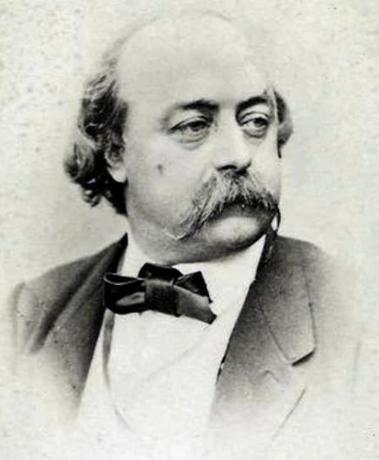Eça de Queirós, Portuguese writer, was born on November 25, 1845, in Póvoa do Varzim. In addition to being a novelist, he was also a lawyer and diplomat. He is the main representative of the realist school in Portugal, with books that caused a scandal in his time, such as The crime of Father Amaro and cousin Basil.
cousin Basil, one of his most famous works, tells the story of Luísa, who, married to Jorge, has an adulterous relationship with her cousin Basílio. Thus, the author's works are marked by social criticism, objectivity and strong anti-romantic character, since they show the reality of their time without idealizations.
Read too: Machado de Assis – main realist representative in Brazil
Biography of Eça de Queirós

Eça de Queirós was born on November 25, 1845, in Póvoa do Varzim, Portugal. His parents weren't married, which at the time was pretty outrageous. So he was baptized in another city—Vila do Conde. His father was Brazilian and his mother Portuguese. When they married, the writer was three years old. So, until 1849, he lived with his paternal grandparents.
He entered the boarding school of Lapa, in 1855, in the city of Porto. Six years later, he started the law course in Coimbra. Graduated in 1866, he moved to Lisbon, where he lived in his parents' house and work as a lawyer and journalist. That same year, he wrote for the newspaper Gazeta de Portugal and moved to Évora. In that city, he directed the newspaper Évora District, of a political nature.
The following year, he returned to Lisbon and became part of theUpper Room (a group of intellectuals who discussed art, politics and science). In 1869 he took a trip to Palestine, Syria and Egypt, which gave rise to travel accounts published in 1870 in the News Diary from Lisbon. Later this year, has becameAdministrator of the Municipality of Leiria.
In 1872, It was namedconsul and took possession in Havana. The following year he traveled to Canada, the United States and Central America. In 1874 he was transferred to the consulate of Newcastle upon Tyne, in England and, in 1878, to the English consulate in Bristol. He started writing for the News Gazette of Rio de Janeiro, Brazil, in 1880. Three years later, became a corresponding partner of the Royal Academy of Sciences.
He visited the writer Émile Zola (1840-1902) in Paris, in the year 1885, when he also became engaged to the aristocrat Emilia de Castro (1857-1934). They got married the following year. In the year 1888, was appointed consul in Paris, and his wife gave birth to the second child. The couple, in all, had four children, before the writer died on August 16, 1900, in Paris.
Do not stop now... There's more after the advertising ;)
Literary Characteristics of Eça de Queirós
Eça de Queirós is part of the RealismPortuguese. Therefore, his works have the following characteristics:
- descriptivism;
- sociopolitical criticism;
- anti-romanticism;
- objectivity;
- analysis of collective behaviors;
- elite criticism bourgeois;
- focus on the present;
- psychological analysis;
- absence of idealizations;
- adultery theme.
Read too: Naturalism – the most extreme current of realistic movement
Works by Eça de Queirós
![Cover of the book O primo Basílio, by Eça de Queirós, published by Companhia das Letras. [1]](/f/05d6ae4ce82701f286f22310b3d9dd92.jpg)
- The mystery of the Sintra road (1870)
- The crime of Father Amaro (1875)
- The tragedy of Rua das Flores (1878)
- cousin Basil (1878)
- the mandarin (1880)
- the relic (1887)
- the Mayans (1888)
- a joyful campaign (1891)
- Correspondence from Fradique Mendes (1900)
- dictionary of miracles (1900)
- The illustrious house of Ramires (1900)
- The city and the mountains (1901)
- Tales (1902)
- barbaric prose (1903)
- letters from england (1905)
- echoes of paris (1905)
- Family letters and Paris tickets (1907)
- Contemporary Notes (1909)
- last pages (1912)
- The capital (1925)
- the Count of Abranhos (1925)
- Alves & Company (1925)
- Correspondence (1925)
- Egypt (1926)
- Unpublished letters from Fradique Mendes (1929)
- Eça de Queirós among his (1949)
cousin Basil
cousin Basil é one of the most famous works by Eça de Queirós. Like a typical realist novel, it deals with the adultery. In the nineteenth century, such a subject caused scandal. And realist writers sought to overturn the myth of romantic love. So, if not Romanticism the romantic couple finds happiness in marriage, in Realism, that happiness is just a lie.
In this work, the love triangleis composed by Jorge, Luísa and Basilio. Jorge and Luísa are married and live in Lisbon. The husband is a mining engineer, successful in his profession. According to the bourgeois standards of the time, the couple has everything to be happy. However, Jorge, on one occasion, travels to Alentejo for work. That's when Luisa's cousin returns from his trip.
basil he is a rich young man who likes to enjoy life and its pleasures, and does not care about anyone's feelings; was a man ofbad character and easily seduces the cousin. Thus, she becomes an adulteress. The story, then, gets complicated when one of the characters most intriguing of the novel — Juliana. Luísa's employee, she is an “ugly spinster”, ambitious and self-interested woman.
Aware of the extramarital relationship of her employer with Basilio, Juliana manages to obtain cards lovers exchanged between cousins. And on an occasion when Luísa rudely complains to the maid because she hasn't tidied up her room yet, Juliana goes to the chase:
“—What do you care what time I come? What do you have with it? His obligation is to clean up as soon as I get up. And if you don't want to, street, you can do the math!
Juliana made up scarlet and nailing Luisa the bloodshot eyes:
“Look, you know what? I can't put up with it! And she threw the broom violently.
- Get out! yelled Luisa. "Leave immediately!" Not another moment at home!
Juliana stood in front of her, slapping her chest convulsively, her voice hoarse:
"I'll leave if I want!" If I want!
[...]
"You don't make me leave me!" You don't make me lose my mind! And with a strangled voice through clenched teeth: " Look, not all papers went to waste!
Luísa backed up, shouted:
"What do you say?"
- That the cards that you write to your lovers, I have them here! And she slapped her pocket, fiercely.”
Then, Juliana starts blackmailing Luísa. The employer is mistreated and humiliated by the maid and only manages to get rid of her with the help of Sebastião (a family friend). However, Luísa falls ill. Without knowing it, the lover sends him a letter. Jorge then reads the letter and discovers that he was betrayed.
So, Luisa, a reader of romantic novels, ends up having a tragic ending instead of a happy ending. Thus, the storyteller do one criticism of romantic and bourgeois ideals and shocks the reader of the time when she shows Basilio's reaction when he learns of his lover's death:
“And they remained silent, slowly. Laughed a lot from a fellow who passed by, stumbling over two black horses: — What a phaeton! What a harness! What a style! Only in Lisbon...
At the bottom of the Aterro they returned; and Viscount Reinaldo running his fingers through the whiskers:
"So you're without a woman..."
Basilio had a resigned smile. And, after a silence, giving the floor a sharp graze with his cane:
— What iron! Could have brought Alphonsine! And they went to the English Tavern for sherry.”
See too: Did Capitu betray Bentinho?
Phrases by Eça de Queirós
Next, let's read some sentences by Eça de Queirós, taken from the texts Disasters and the laws of emotion and First letter to Madame de Jouarre:
- "For every man, humanity consists essentially in that portion of men who reside in his neighborhood."
- "To cry it is necessary to see."
- "Distance and time make the grossest tragedies light news."
- “There is only man, among animals, to mix the languidness of a thin gaze with slices of Foie gras.”
- "Only the portion of matter in man makes women resign to the incorrigible portion of the ideal, which is also in him."
- "Everything tends to ruin in a country of ruins."
Image credit
[1] Company of Letters (reproduction)
by Warley Souza
Literature teacher



